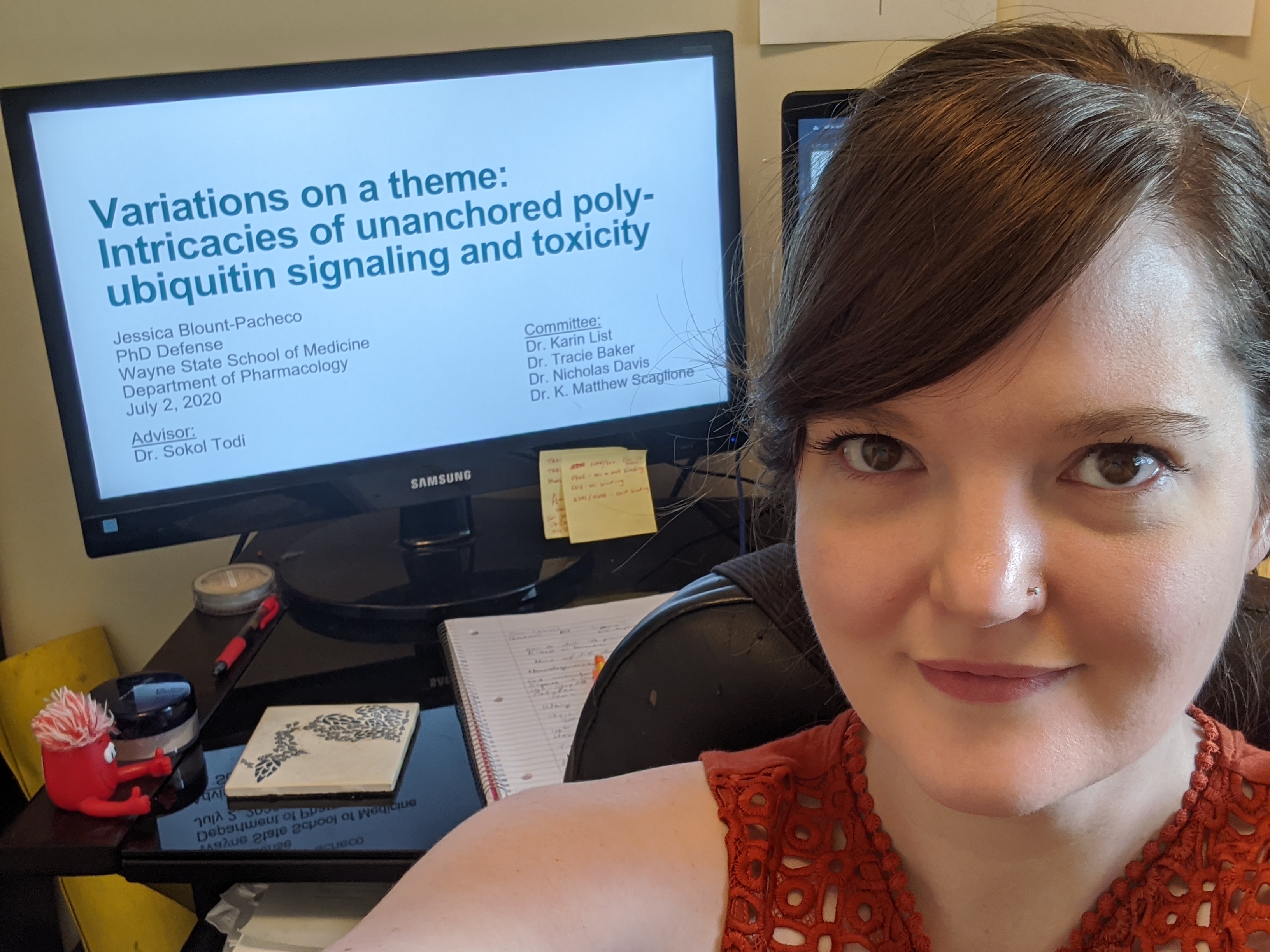
The coronavirus pandemic has changed nearly every aspect of our lives. Fortunately, Ph.D. students are trained to quickly adapt when circumstances go awry. Now, with social-distancing restrictions in place for the fall semester at Wayne State University, students and mentors are rethinking how they do business, conduct research, and manage the very last step of obtaining a doctoral degree--the dissertation defense.
On July 2, Jessica Blount-Pacheco, a doctoral candidate in the School of Medicine's Department of Pharmacology, defended her dissertation from home via Zoom. She and her advisor, Professor of Pharmacology and Associate Dean of The Graduate School Sokol Todi, Ph.D., share firsthand insights and advice on how Ph.D. candidates can prepare.
Tips and tricks on how to make the most of a virtual format
Sokol Todi: Choose the right platform for you. We tested Microsoft Teams and Zoom. We selected Zoom ultimately due to better quality of video and audio for our respective networks.
Jessica Blount-Pacheco: Do a “tech rehearsal.” The day before the dissertation defense, we set everything up – the laptop, an extra screen, ethernet – and shared my presentation over Zoom to iron out any streaming issues.
JBP: Take precautions to prevent interruptions. These include: muting all audience mics until needed for questions, shutting off audience cameras to avoid bandwidth issues, and using wired internet in place of Wi-Fi.
ST: Mentors, prepare your introductions. In the past, when I have had the pleasure and pride to introduce my students before their presentations, I have not used a structured introduction. With a virtual format, to keep attendees engaged, I prepared a short introduction with a few visual designs to capture the eye, and was able to cover everything I wanted to.
ST: Set some ground rules. During an in-person dissertation defense, it is not uncommon to get interrupted with questions when the answer is just one slide away. However, with a virtual meeting, we decided to ask the attendees to type their questions into the chat window. As moderator, I had the liberty of bringing them up myself at the most appropriate point.
ST: Keep the audience engaged. Breaks every 10 minutes or so for questions or comments can help re-engage the audience. You can even put up a big question on the screen to lead the audience into a discussion before bringing them back to the presentation.
Aspects made easier by being online
JBP: More time at home to prepare. Because of social distancing, our time in the lab is limited. It was undeniably helpful to shift focus from experiments to writing, reading, and preparing my presentation.
JBP: Less stage fright. Presenting from my own home without a crowd physically in front of me eased most of my nerves about public speaking. Essentially, my dissertation defense felt almost the same as my private rehearsal, with added breaks for questions.
JBP: All my family and friends were able to attend. No one had to choose between their health and my defense, and family members on the West Coast were even able to tune in. Especially during this time of extended social distancing, seeing so many of my loved ones in one “place” was uplifting and helped me feel more excited and less nervous.
Navigating compounding stressors
JBP: Grappling with the added stress of a pandemic. The pandemic and a PhD defense are both stressful in their own ways, and dealing with both at once is quite a challenge. Because we’re all spending more time at home and less with other people, the intensity of preparing your thesis and defense can be isolating. I found it helpful to reach out to other people – both peers in my field who have been through the PhD process before, and friends and family who could comfort me and boost my confidence.
JBP: Keeping a schedule while quarantined can be difficult. This is especially true during a global pandemic. There was a lot of day-to-day variability in my productivity, and some days my attention span couldn’t handle much more than half-heartedly reading review papers and hoping I remembered something from them. I stopped trying to quantify my daily productivity and instead pushed to make progress in writing and reading on a weekly basis, doing as much as I could instead of worrying about not doing enough.
ST: The distance of virtual existence. Nothing online can really substitute for the in-person dissertation defense: the energy, the “oohs” and “aahs” from the audience at exciting results, the ability to give a real hug, tell someone in person how proud you are of them, and have a drink to their tremendous success can’t be replicated by a camera and mic.
Celebrate!
ST: This is a great achievement, and nothing, not even COVID can take that away from you and your loved ones. Enjoy it. This is a huge last step towards a brave new future.
JBP: The day of my defense, it absolutely felt bizarre to sit in my home office for a few hours, become a doctor, and then walk down the hall to my living room couch to drink celebratory bourbon with my husband. But it also felt good! Don’t forget to celebrate this enormous accomplishment.
Responses have been lightly edited for clarity.
This article originally appeared at https://gradschool.wayne.edu/news